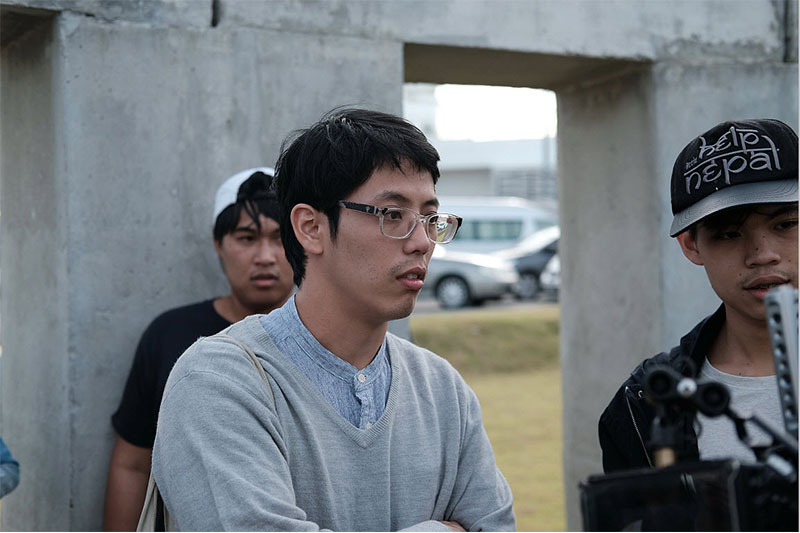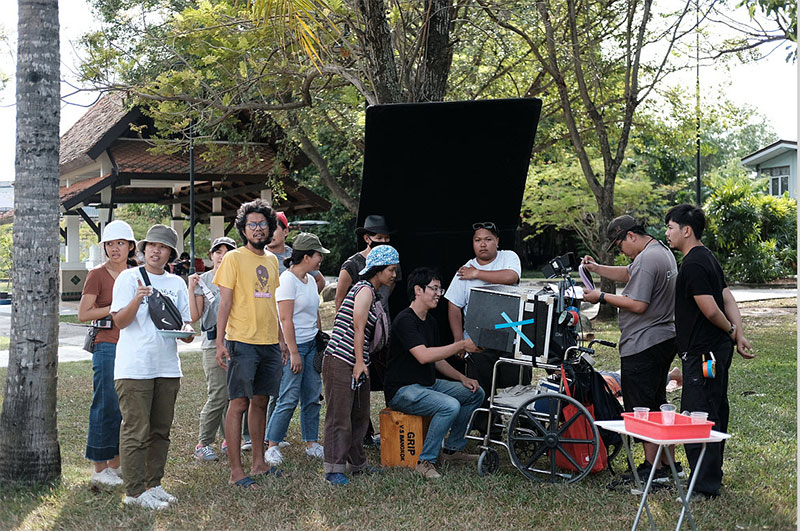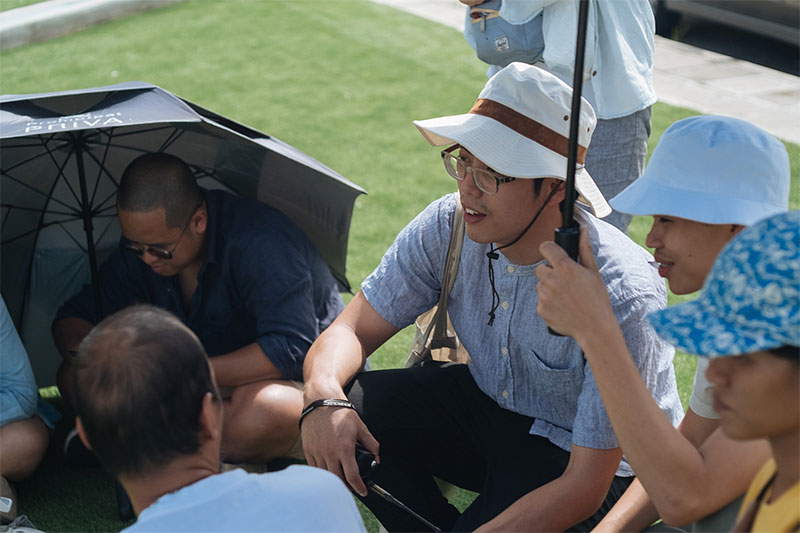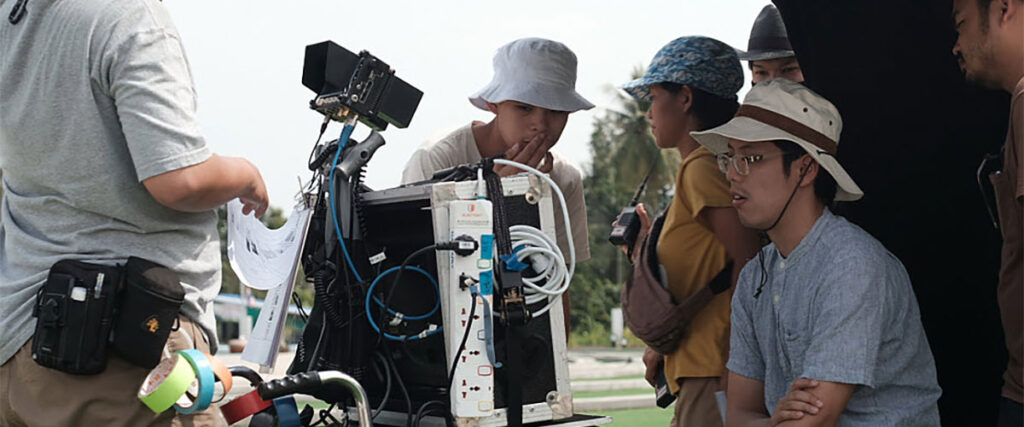Chulayarnnon Siriphol films have been screened at festivals worldwide. Here, he shares some insight on making movies.
At 32 years old, Chulayarnnon Siriphol is already renowned for his surreal style of narrative. Over the course of 14 years, the filmmaker has built up an impressive portfolio that has garnered him much respect from his industry in both Thailand and abroad, with much of his work geared at documenting and raising questions about contemporary Thai politics. Since 2004, Chulalayarnon has been the recipient of a remarkable 6 awards from the Thai Short Film and Video Festival in Bangkok. In 2012, he was bestowed with the ‘Best Alternative Visual Art’ award in South Korea, and his short film, Vanishing Horizon of the Sea got a special mention at the 2014 Singapore International Film Festival. Here, he shares his advice for aspiring filmmakers.

For Chulayarnnon, filmmaking is all about relevance. According to him, it is of the utmost importance that filmmakers be up to date with what the world is talking about and with what society wants to see. Beyond just studying up on books and the news, he recommends frequent trips to the cinema, and highlights the importance of talking to as many different types of people as possible in order to truly understand your context. He explains, “you can only make the connection between what you have read and the people you have interviewed once you have all the information. If you don’t do the research and instead only focus on yourself, then you’ll quickly find that it’s impossible to create something new.”

Chulayarnnon recommends striving to find a narrative thread as a filmmaker. “Don’t neglect your previous work. Some artists focus on each individual work, creating one piece at a time without thinking about their past or future projects. Personally, I always reread my work to maintain a connection between all my projects.” For him, reevaluating previous work is all part of evolving as an artist. Upon rewatching his short films from 10 years ago, Chulayarnnon was struck by just how large a gap there was in terms of not only time, but ideas. In returning to his works, he hopes to not only avoid repeating himself, but also make out a common thread of identity across the years.
When it comes to storytelling, for this filmmaker, it’s as important to know when to end your story as it is to be clear on where to begin it. In fiction, he explains, there is a very classical, 3 act structure taught in film schools all over the world – in layman’s terms, a beginning, a middle, and an end. Being an experimental filmmaker, however, means that Chulayarnnon does not necessarily always adhere to this. “For me, a story should end when you watch the film yourself and feel fulfilled. Even when you feel that you have so much more to tell, it might not be important for your film.” And, if you’re unsure when this is – seek advice. “You can turn to your friends and other filmmakers to comment and critique your film. Listening to others’ opinions can help.”

As an experimental filmmaker, there’s no need for artists like Chulayarnnon to conform to certain presupposed notions like structure and linear storytelling, and it is this ideology that forms the basis of his next piece of advice. “Think outside the box. To experiment is to walk alone in the jungle. You have to keep going further and further until you discover something new, something that no one has done before.” Part of his own experimentation lies in his tendency to interweave personal memories into a political and social context, something that has become a staple across his work. An example of this would be his poignant film A Brief History of Memory, which featured a mother’s voice speaking about the loss of her son. It was made in reaction to a fatal incident in the Nang Lerng community in 2009, during which two people were killed by red-shirt supporters. Its blurry black and white imagery reads as something like an involuntary memory and speaks of the loss shared by everyone involved.
On several occasions during our conversation, Chulayarnnon brings up the neverending problem of film financing. “As creatives, we often have the ideas but not enough budget to bring them to life. For me, I always work on a budget, meaning we always have to adjust the ideas and proposal to fit with reality.” This doesn’t mean your mission is impossible, however. “Technology is cheaper today than ever before, he says, encouraging budding filmmakers to ignore overly expensive equipment. “We have phones to take photos and videos with, and existing platforms like Youtube where you can show your work and connect with people.”
Finally, Chulayarnnon touches on his pillars of filmmaking; the importance of maintaining a close relationship with one’s actors, the benefits of creating a safe and comfortable environment for everyone involved in the filmmaking process and the value of truly understanding one’s audience. Given that he teeters between genres, and therefore has a diverse viewership, his emphasis on just who his audience is is critical. “Whenever I make a short film, I always have to create an invisible audience in my mind. Who will watch my film? Will it go to mass media, film festivals or art exhibitions? It is also important to consider how the audience will perceive the work in the platform that it is presented. The audience from the art world and the audience from the film world are quite different.”
Looking forwards, Chulalayarnon is determined to continue making thought-provoking pieces that lie definitively outside of the box. He is currently working on a big project entitled 10 Years Thailand alongside 4 hugely successful Thai film directors. The film will be a collection of short films that re-imagine what their country will be like in 10 years time. He explains, “the film is going to be an omnibus film that runs for approximately 100 minutes, featuring 5 short films from each director”. Sticking true to his roots and reasoning, it’s another project that’s all about the big idea and context. Given his success so far, it’s clearly a route worth learning from.




